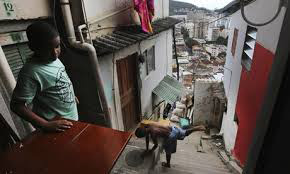Bishops of Brazil Issue Red Card to FIFA & World Cup Organisers
Catholic Communications, Sydney Archdiocese report:
19 Jun 2014
19 Jun 2014
FIFA set to make more than $4 billion from the 2014 World Cup but none will go to help Brazil's poor and displaced
As the World Cup competition began on 12 June, the Catholic Bishops Conference of Brazil issued a "red card" to all levels of Brazil's Government and to FIFA, the international body set to make more than $4 billion from the month-long event.
In soccer a "red card" is given to players who commit serious fouls and are expelled from the game, and it was on a "red card" that Brazil's bishops voiced their concerns at the "inversion of priorities" where more than $11 billion of public money, instead of being spent on the basic needs of Brazilians, has been put into a sporting event.
Favela children play soccer in the streets but price of tickets at World Cup is half of what their families earn in a year
Caritas Australia which supports programs in Brazil's favelas in partnership with the Movement for the Defence of Favela Residents (MDF) shares the Brazilian bishops' concerns, particularly with regard to families and communities of the favelas.
Although frequently described as slums, Brazil's favelas are much more and are often the result of the poor coming together to build their homes, share utilities and create a safe environment for themselves and their children.
Beira Rio stadium is just one of seven of Brazil's spectacular new or handsomely refurbished stadiums
In January this year Caritas Australia appointed the Brigidine Sister to a new role. But although she is now Regional Engagement Coordinator for Victoria, Tasmania and South Australia, her love and concern for the people of South America and in particular those of Brazil's favelas remains unabated.
"In Brazil extreme wealth flourishes side by side with extreme poverty," she says and is fearful that the many thousands of displaced families and communities of the favelas will more than double as Rio de Janeiro prepares for the 2016 Summer Olympics.
Sister Margaret Fyfe of Caritas Australia and until early this year Latin America Program Coordinator
For the past two years, in favelas across Brazil entire communities have been forced out of their homes, often at gunpoint as Brazil's police and army cleared vast tracts of land for new stadiums and infrastructure for the World Cup.
"Some of these families were offered alternative accommodation by the Government but these were in areas more than 50 kilometres from the city. To earn money the people in the favelas rely on getting construction work in the city, on running little stores and selling goods door to door. By moving them out of the city, they not only lose their livelihoods but few could afford the bus fares that would be needed to get them into the city each morning," Sr Margaret says. "It is difficult to build a viable future for yourself when you are moved far away from schools, work and other facilities."
A mural in Rio reads destroying our community for the world cup and tells FIFA to go home
"The costs of staging the World Cup and the 2016 Summer Olympics will cripple the poorest communities in Brazil long after the events have been held," she adds and points out that already the World Cup has resulted in a sharp increase in the cost of living among the favela families Caritas Australia and MDF work with.
Evicting or moving the poor from inner city areas to make way for large international sporting events is not new. When Beijing hosted the Olympics in 2008, the Geneva-based Centre of Housing Rights and Evictions estimated as many as 1 million poor - a figure disputed by China - were displaced to make way for nine spectacular Olympic venues including the famous Australian-designed National Aquatics Centre.
When the Olympics were held in Seoul in 1988, the Geneva-based group claims as many as 750,000 families were displaced to make way for construction of stadiums and facilities.

The poor in Rio's favelas have little but for many the Olympics and FIFA World Cup are taking even that
"Nations are keen to host these big international events and for Brazil, the Government sees hosting the World Cup and later the Olympics as a sign to the world that Brazil is an emerging and successful economy. What is not being addressed is the inequality in this progress and the thousands of families who have lost their homes and their communities," she says.
Caritas Australia has begun a petition to urge FIFA and the International Olympic Committee (IOC) to ensure when choosing host countries and overseeing their multi-billion dollar sporting events, that the events are just and sustainable and do not impact the poor.
In Brazil a campaign begun by the Bishops and involving more than 30,000 women religious, nearly 8000 priests and 2700 religious brothers has asked that the people of the favelas and those living on the streets not be expelled or evicted from their locations by police or government officials.
"FIFA officials and those at the IOC need to take steps to ensure that everyone, not just the privileged few, enjoy the benefits of the World Cup and the Olympics. By doing this, they will also be ensuring that these events remain true to the principles of equity and fairness that underpin them," Sr Margaret says.
To find out more about Caritas Australia and to sign the petition for justice and fairness in sport, log on tohttp://www.caritas.org.au/
Shared from Archdiocese of Sydney
Comments